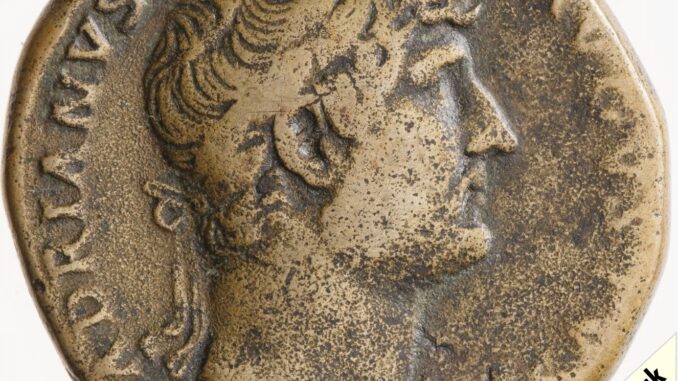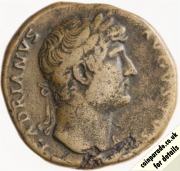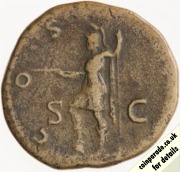
 The 125AD Sestertius - Hadrian
The 125AD Sestertius - HadrianOrichalcum Sestertius of Emperor Hadrian. Orichalcum is a gold-coloured bronze alloy used by the Roman Empire on several coins. Diameter 32mm and weighs 22.5g.
As the Rome Mint was closed while Hadrian was travelling 122-125AD, it used this image when it reopened in 125AD therefore the coin was minted around 125-128AD (source: Museums Victoria).
The Obverse shows the draped bust of Hadrian. Legend is "HADRIANVS AVGVSTVS".
The edge is plain.
 The Reverse shows Virtus, the deity of bravery and military strength and the personification of the Roman virtue. Virtus holds a spear and a parazonium, which is a long triangular dagger.
The Reverse shows Virtus, the deity of bravery and military strength and the personification of the Roman virtue. Virtus holds a spear and a parazonium, which is a long triangular dagger.The legend "COS III" means that Hadrian was Consul for the third and last time.
"SC" means senatus consultum, or 'by decree of the Senate' so the coin was an official issue.
Image credit: Museums Victoria
Mintage: Not known
Minted at Roman Mint
More information (monarch, year, mint, country, category) can be found below coin listings.
Below are some coins currently being offered on eBay. As an eBay Partner, We may be compensated if you make a purchase.
List items on:
List items on:
Hadrian (Emperor 117AD-138AD)
Classification: Roman Emperor, Roman Imperial (96-235AD)Hadrian [CAESAR PVBLIVS AELIVS TRAIANVS HADRIANVS AVGVSTVS] was Emperor of the Roman Empire from 117 to 138, a long reign of almost 21 years. He was born Publius Aelius Hadrianus on 24 January 76 and died 10 July 138 (aged 62). He was married to Vibia Sabina. Regnal name Caesar Traianus Hadrianus.
Hadrian is probably most famous in the UK for the building of Hadrian's Wall in the north of England.
Category: Roman
The Roman Empire was one of the largest Empires in history, covering most of Europe, Britain, parts of Asia, the Middle East and North Africa. It was in existence from 27BC to 476AD, more than 500 years. And all these places used Roman coins throughout the era.Originally coins were minted only in Rome, but by the third Century there were mints in other countries too. These mints sometimes produced more than 2 million coins per month to meet demand. Coins typically depicted the Emperor on one side and some other image or letters on the other. During the Empire, more than 10,000 different types of coins were created using copper, silver and gold.
Roman coins are usually classified as:
- Roman Republican Coins (about 300BC - 27BC)
- Roman Imperial Coins (27BC - 96AD)
- Roman Imperial Coins (96AD - 235AD)
- Roman Imperial Coins (235AD - 476AD)
- Roman Provincial Coins
The Denarius was the standard Roman silver coin and there were a range of others. As a guide, in the early republic (after 211BC) there was the Sestertius (=4 denarii), Dupondius (=5), As (=10, a tenner), Semis (=20), Quincunx (=24), Triens (=30), Quadrans (=40), Uncia (=120) and Solidus (=1000, it was gold). Values fluctuated later due to debasement and inflation.
The exchange values were as follows:
1 gold aureus = 25 silver denarii
1 silver denarius = 16 copper asses
1 brass sestertius = 4 copper asses
1 brass dupondius = 2 copper assses
1 copper as = 2 copper semisses (or 4 copper quadrantes)
The standard gold coin was the Aureus and was equal to 25 denarii or 100 sestertii. It's not far off the weight of a modern gold sovereign. The Aureus was introduced by Julius Caesar around 49BC and was the principal gold coin until about the 4th century when it was replaced by the gold Solidus.
The great part of this is that you can put together a really nice Roman coin collection with very little money, as many coins (although not all) are common and inexpensive. The coins are the best part of 2000 years old and are exciting to collect.
For more information see our articles:
Which Mint: Roman Mint
The origins of the Rome mint are from the manufacture of a silver coin near to the Temple of Juno Moneta back in 269BC. Juno was the personification of money.Due to the size of the Roman Empire, Rome could not produce all the coins needed and Roman mints were set up in 27 locations, and there were more than 600 provincial mints scattered about the Empire. During overseas campaigns, Generals such as Caesar and Marc Anthony would mint their own coins to pay their armies.
Mint marks were used on the coins to differentiate the mint of manufacture.
Country of Origin: Roman Empire
The Roman Empire ran from 27BC to 476AD and was the post-Republican period of ancient Rome. It covered a large territory of Europe, Northern Africa, and Western Asia. It was ruled by an Emperor.







